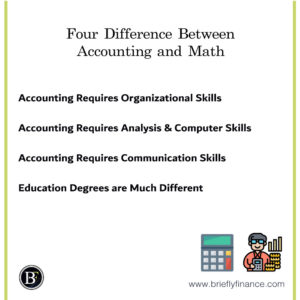Mathematics and accounting have always been acquainted with each other, so they are sometimes thought to be similar. They both include numbers and computation, but math and accounting are two different concepts with different approaches. Most of the time, the common conception about these two concepts is saying that accounting is just like math.
Accounting may include some computations and use equations included in math, but it is not as complicated as math. It does not usually involve some nerve-wracking calculations, just the fundamentals of mathematics and some excellent analysis of problems. Additionally, in accounting, you don’t have to understand all the difficult aspects of mathematics as it’s not hard-core math.

Attribution: The icons has been designed using resources from Flaticon.com
Being an accountant is more than just computing financial aspects and other number-related matters. It’s also about dealing with clients properly, preparing reports, and giving presentations. So, you can’t just rely merely on your mathematical knowledge as it also involves other communicating, managing, strategising, and other vital aspects of accounting. Thus, separates accounting from mathematics.
-
Accounting Requires Organisational Skills
Accounting requires other factors like organising and managing than just adding, subtracting, multiplying, and dividing numbers. Because working in financial sectors also involves gathering data and keeping them organised to avoid issues. Therefore, the relevance of having excellent organisational and management skills is really essential in accounting.
In accounting, you will not just be computing the financial assets of your clients, but you are also responsible for keeping everything on record. Therefore, it’s essential to have an effective system that you can use to organise and manage all the data and information. Moreover, keeping everything organised is necessary to be able to do your duties as an accountant conveniently.
-
Accounting Requires Analysis and Computer Skills
Knowing the basics of math, like adding, subtracting, multiplying, or dividing numbers, is just one of the many skills you should acquire to be a good accountant. You also need to have various skill sets that will make your job easier. It’s not true that accountants only focus on solving nerve-wracking math problems because most accountants also need to be analytical, computer literate, good in decision making, and have a knack for problem-solving.
One of the common tasks of an accountant is to interpret and analyse the data presented. So, if you’re aiming to get a degree in accountancy, having great analytical skills can be your edge in the future when you apply for a job. It also requires you to know and understand the basics of using a computer.
There is also a need for accountants to navigate software like spreadsheets and accounting systems to manage specific tasks. So, if you have a computer subject in your college, you should also pay attention to that.
It’s also essential to understand the fundamentals of business management to meet the demands and needs of their clients. Since if the accountant does not understand basic business aspects, it will be hard for him to perform some of his duties.
-
Accounting Requires Communication Skills
Accounting professionals, especially those working and interacting with clients or customers, are required to have effective communication skills. They need to be able to express what they want to say clearly. Additionally, interpersonal skill is essential for accountants to have a great working environment since effective communication with colleagues is vital.
Accountants should be able to relay the message to their clients to meet their needs. It’s the best way for them to do their job successfully because even though you have the solution if you can’t relay it properly, it’s useless. As a result, you may not resolve your client’s issue and even make it worse.
Besides good communication skills, accounting professionals also need to develop excellent writing skills since creating reports and presentations are also part of their job. They need to have the ability to write their thoughts concisely and clearly to present their ideas properly. Therefore, accountants also need to be keen on details, especially in writing reports to do it in the proper format and include the correct data required.
-
Education Degrees are Much Different
Accounting differs from math because its majors are not under math degrees. Usually, accounting is offered under business degrees which clearly means that it’s not just like math. Yes, it involves solving math problems, a little bit of algebra and statistics, but most of its aspects are related to business and finance management.
There are separate courses that include intensive and complicated mathematical computations, which is why if you’re into those kinds of things, accounting might not be challenging enough for you. But, on the other hand, accounting is ideal for those who understand numbers and at the same time with high interests in business and finance management.
Final Thoughts
Mathematics is just a part of accounting and other vital variables such as organisation, data analysis, and business-related factors. Thus, accounting is not just like math because it requires more than just computing numbers and other skills.
Accounting professionals are responsible for communicating with clients and workmates effectively, managing and organising data, analysing data and situations, making reasonable decisions, and writing financial reports. Therefore, the misconception about accounting involving all math variables is not true given all the differences provided. Accounting is more of a business-related major with a bit of math.
Related Posts:
- 3 Types of Financial Statements Explained
- 5 Key Limitations of the Balance Sheet
- Finance vs Economics: What’s the Relation Between Them?
Disclaimer: Above links are affiliate links and at no additional cost to you. I may earn a commission. Know that I only recommend products, tools, services and learning resources I’ve personally used and believe are genuinely helpful and relevant. It is not because of the small commissions I make if you decide to purchase them. Most of all, I would never advocate for buying something that you can’t afford or that you’re not yet ready to implement.
